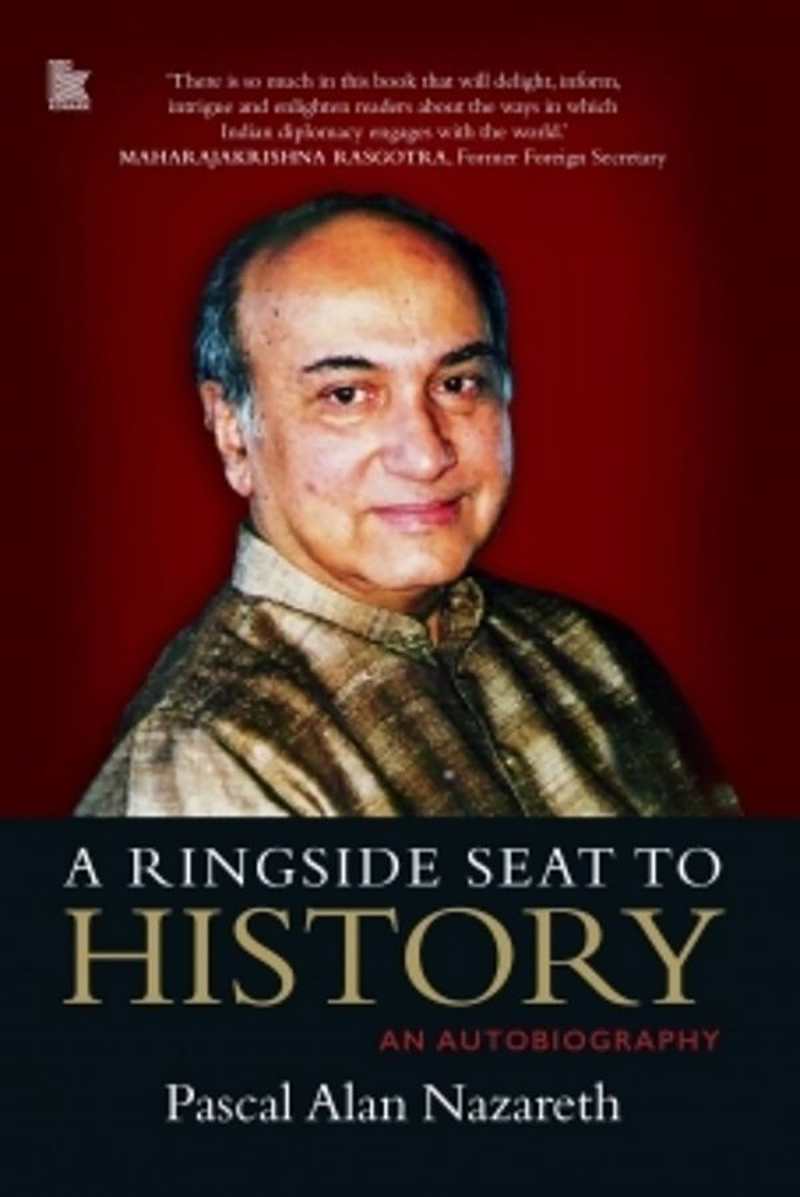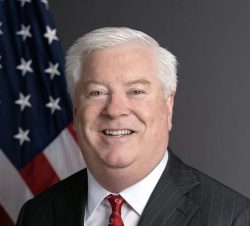
December 3, 2021
Former Indian Ambassador to Japan Aftab Seth contributed a book review on a memoir written by his colleague Indian diplomat Alan Nazareth titled “A Ringside Seat to History” to The Japan News. Nazareth also worked at the embassy in Tokyo. The book was published by Konark Publishers Delhi Seattle. The following is a book review by Seth.
Alan writes about his childhood in Mangalore. And later at Loyola College in Madras. He tells of his father’s inspiration derived from the example of two former colleagues Eric and Alfred Gonzalves, which impelled him to send Alan his son to Loyala college. Alan’s first attempt to join the civil service ended in a disappointment and failure. Far from giving up, Alan persisted and was given sage advice by a former colleague Peter Sinai who had scored well in the examinations and interview. On the second try Alan was successful and though his father would have preferred him to join the home service , the IAS as it is called, Alan opted for the Foreign Service.
He writes amusingly about his training at Metcalfe House which was luxurious and also his time training at the Charleville hotel in the hill resort of Mussorie, which is still the training centre for young civil servants. His district training in snake-infested bungalows in the state of Bihar gave him the first taste of danger, as poisonous snakes such as the cobra and viper often lay lurking under toilet seats! Alan also tells of his first meeting with PM Nehru during which the Foreign Service trainees learned that the young Dalai Lama had escaped from Tibet and sought refuge in India. Alan had subsequent meetings with the Dalai Lama which are described later in the book.
Having been allotted Japanese as his official language, Alan began a long journey by ship to Yokohama accompanied in the first Instance by his mother. However, Alan had already met his bride to be Isobel and had been smitten by her! As events turned out, Alan returned to India after a year in Japan, married Isobel and brought her back as a bride to Tokyo. Alan was first put up at the Imperial Hotel and then at the Azabu Prince Hotel, while he looked for a place to live in. He found a charming Japanese house and was able to recruit a Japanese” Jochu san, Masako to help him look after the new home.
There are interesting episodes about his attempts to learn Japanese at the Naganuma School and his struggles with Kanji and hiragana and katakana. During his tenure he witnessed the tragic death of India’s Air Marshal Mukherjee who died at a restaurant while attempting to eat a piece of sushi!
After passing his Japanese exams Alan was put in charge of the commercial section where he met for the first time with Dharma Teja a businessman who later acquired much notoriety.
Alan’s tenure coincided with the one year this reviewer spent at Keio university. Alan was most helpful in helping my Japanese friends set up a study group on India at Keio university. Alan was fortunate to have been able to accompany his ambassador Mehrotra on the first test run of the Bullet train Shinkansen from Tokyo to Nagoya.
From Tokyo, Alan went to Rangoon, where Ne Win had taken overpower. He tells of the troubles and travails of the Indian community who were being persecuted by the government and the abortive efforts of the Indian embassy to help the community by storing their gold and jewels.
The fascinating story of the visit to Rangoon of a young Mrs Indira Gandhi and her swim in the sea at Ngapali bay, secretly watched by the security guards of Ne Win, gives a glimpse of a slightly vulnerable soft spoken woman who had a sense of humour. It gives no inkling of the steely lady, who later became PM and the victor of the 1971 war with Pakistan.
Alan’s tenure in New York at the Consulate General from 1967 to 69 saw the momentous assassination of Martin Luther King, the peak of the student unrest and agitation at many universities in protest at the brutalities of the Vietnam War.
Alan’s cloak and dagger escapades trying to nail down Dharam Teja and his wife in Costa Rica are told with much panache!
The birth of son Andy in the midst of all this excitement was a blessing the family enjoyed.
The author’s stint in Peru saw a devastating earthquake graphically described, including his wife Isobel’s heroic efforts to provide succour and relief to the victims. Alan’s attempts to pursue the fugitive Tejas continued. During Alan’s tenure as Charge d’affaires a great break-through was made in trade with Peru, with India agreeing to buy copper. He talks of his exciting visit to Machu Pichu, the land of the ancient Inca civilisation. For Alan, however, the most rewarding event was his meeting with Mother Theresa on a flight out of Venezuela.
Some years later the Mother was helped the family by praying at the bedside of a sick child who lay gravely ill in a hospital in New York.
While in Peru, Alan was able to keep his promise to Mother Theresa and helped to open a branch of a home for the incurably sick and aged in Lima.
There was a brief interlude at the Ministry from 1974 to 1975 when he worked at the Economic Division and had commercial successes in Bangladesh.
The next 3 years were spent in London at the High Commission where Alan looked after the Supply Mission. Soon however, the 1977 elections led to the defeat of PM Indira Gandhi and the advent of PM Morarji Desai. As the Deputy High Commissioner Natwar Singh had been closely associated with Indira Gandhi, PM Desai removed him and sent him to Zambia as High Commissioner.
Alan moved into Natwar’s place and took up residence in the official home of the Deputy High Commissioner ‘Sun House.’
Described in detail is the visit of PM Desai to London and the scare created by a fire which broke out during the PM’s meeting at the office.
The other embarrassing crisis in London arose on account of ‘virginity tests’ being carried out on Indian women attempting to enter the UK. The crisis was deftly handled by Nazareth.
The years 1979 to 1982 were spent in Ghana from where Alan was concurrently accredited to Liberia , Togo, and Burkina Faso.
The author’s time in West Africa saw dramatic coups , executions, robberies at his home and the temporary arrest of his wife Isobel!
He admits that this posting was the most dangerous in many ways. Despite all these tribulations Alan made a breakthrough in arranging for the import from India of Buses made by the Tata company in Ghana and in Liberia.
The next three years from 1982 to 1985 were most rewarding for Alan. He headed the Indian Council for Cultural Relations with much aplomb. He had the good fortune of working with doyennes of Indian culture, Pupul Jayakar and Kapila Vatsayan. He also worked closely with dancers Mrinalini Sarabhai, the talented architect Charles Correa, and L P Sihare and Saryu Doshi heads of the galleries of modern art in Delhi and Bombay respectively.
With their help and inspiration Alan mounted major festivals of India in UK and USA. These events were extravaganzas of Indian dance music; displays of the best of Indian crafts and hand woven and embroidered fabrics from all parts of India, which were often accompanied by erudite lectures by distinguished experts in these fields.
In the reverse direction he was able to organise the best of foreign dance ,music and poetry in India. Rudolf Nureyev was a leading member of the Paris Opera Ballet; Turkish whirling dervishes performed in India and the New York Philharmonic orchestra, under the baton of Zubin Mehta gave memorable performances in India.
One interesting story told is the ‘hard ball’ played with the British High Commissioner Sir Robert Wade Gary, over the question of the use of corporate sponsors by the British embassy, for the visit of a leading theatre company. During this period Alan narrowly escaped death because of flight schedule problems which prevented him from being on the ill-fated Kanishka plane of Air India which brought down by a bomb blast over the Irish Sea on a flight from Toronto.
The discovery of a serious illness of his son Andy at the end of his tenure in Delhi was a terrible shock, alleviated to a small extent by the prompt and kind decision of Foreign Secretary Rasgotra to post Alan as Consul General in Chicago in order to pursue the treatment for his son at the Sloane Kettering hospital in New York. This entailed quarterly visits from Chicago to New York. Fortunately for Alan he was able to get a transfer as Consul General New York to enable regular treatment for his son’s cancer. Alan continued his interest in cultural work and arranged performances of the noted Orissi dancer Sanyukta Panigrahi and concerts by violinists Yehudi Menuhin and L Subramaniam. It was in New York that Mother Theresa by a providential coincidence learned that Alan Nazareth’s son was ill at Sloane Kettering; she remembered Alan from Venezuela and promptly came to Andy’s bedside to pray. Miraculously Andy’s illness got progressively better!
From 1989 to 1992 Nazareth worked in Cairo staying at the charming ambassadorial residence on the banks of the Nile located in the quiet suburb of Zamalek , an island separating two arms of the massive Nile river.
Alan had interesting interaction with the Grand Sheikh of Al Azhar university , a1000 year old seat of learning arranging for help in Arabic language teaching in India and for Indian professors to teach at Al Azhar.
From Cairo Alan and Isobel made an interesting trip by road to Israel to attend service at the Church of the Holy Sepulchre, visit the Wailing Wall and the Dome of the Rock. Jerusalem was the holy centre for the followers of the three great religions, Islam, Judaism and Christianity.
Alan’s last posting was in Mexico where he spent over two years from 1992 to 1994. He was also accredited concurrently to Guatemala, El Salvador and Belize. He describes his time in Mexico and in each of the countries of his concurrent accreditation with his customary eye for detail and his acute power of observation. The best part of the end of his career was his return to India via San Francisco, Tokyo, Seoul, Beijing, Shanghai, Bangkok to Delhi and finally to his home in Bangalore! Staying with colleagues en route Alan and Isobel brought their 35 years in the Foreign Service to a happy and enriching close.
Not one to sit on his laurels Alan remained active, writing a definitive book on Gandhi’s leadership, promoting opera in Bangalore and leading goodwill missions to Pakistan. Incidentally the book on Gandhi was translated in to a few languages including Japanese. The author went to Japan after several decades for the launch of the book by Princess Takamado.
He and Isobel also suffered the terrible tragedy of the loss of their daughter in the prime of her life. The tribute paid at the funeral of Seema by Isobel, is the most touchingly moving part of this memorable memoir.
The book is accompanied by some annexures carrying letters by famous leaders of the world addressed to the author.
There are also many photographs in the book which illustrate the several famous men and women who are described in the text of the narrative. Mother Theresa, Henry Kissinger, Melina Mercouri, the Greek Minister of Culture, Prime Ministers Rajiv Gandhi, Indira Gandhi, The Dalai Lama Pope John Paul II, President Jimmy Carter and Princess Takamado of Japan, are among the people whose images reflect the many faceted life led by Alan Nazareth. The most interesting photograph is one taken at the Indian High Commissioner’s house in London in June 1977, at a banquet in honour of PM M Desai who was visiting the UK. Seated on the carpet are Lord Louis Mountbatten, High Commissioner B K Nehru and Foreign Secretary Jagat Mehta.
Standing near the author are former Prime Ministers Edward Heath, Harold Macmillan, Douglas Home and Leader of the Opposition Michael Foot; a galaxy of stars under one roof!
This perceptive, lively narrative is penned by a storyteller par excellence. Scholars and lay readers will find much joy and profit in reading this book.
Top Articles in Editorial & Columns
-

Riku-Ryu Pair Wins Gold Medal: Their Strong Bond Leads to Major Comeback Victory
-

40 Million Foreign Visitors to Japan: Urgent Measures Should Be Implemented to Tackle Overtourism
-

China Provoked Takaichi into Risky Move of Dissolving House of Representatives, But It’s a Gamble She Just Might Win
-

University of Tokyo Professor Arrested: Serious Lack of Ethical Sense, Failure of Institutional Governance
-

Policy Measures on Foreign Nationals: How Should Stricter Regulations and Coexistence Be Balanced?
JN ACCESS RANKING
-

Japan PM Takaichi’s Cabinet Resigns en Masse
-

Japan Institute to Use Domestic Commercial Optical Lattice Clock to Set Japan Standard Time
-

Israeli Ambassador to Japan Speaks about Japan’s Role in the Reconstruction of Gaza
-

Man Infected with Measles Reportedly Dined at Restaurant in Tokyo Station
-

Videos Plagiarized, Reposted with False Subtitles Claiming ‘Ryukyu Belongs to China’; Anti-China False Information Also Posted in Japan























